|
|
|
Sort Order |
|
|
|
Items / Page
|
|
|
|
|
|
|
| Srl | Item |
| 1 |
ID:
076739
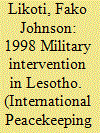

|
|
|
|
|
| Publication |
2007.
|
| Summary/Abstract |
The 1998 military intervention in Lesotho by South Africa and Botswana was shrouded in controversy. While South African officials claimed that the intervention was a Southern African Development Community (SADC) humanitarian peacekeeping mission to rescue Lesotho from a coup, the intervention appears to have been inconsistent with the UN Charter and with the SADC Treaty. Indeed, SADC had no role in legitimating this intervention because proposals relevant to coups had not been ratified by the SADC Summit. It would appear that the motivation for this intervention, at least on the part of South Africa, was to secure strategic resources, mainly water. National interest explains the intervention, rather than the rescue of a captive state as South Africa claimed.
|
|
|
|
|
|
|
|
|
|
|
|
|
|
|
|
| 2 |
ID:
083439
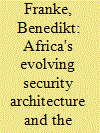

|
|
|
|
|
| Publication |
2008.
|
| Summary/Abstract |
Following decades of feeble attempts, Africa's states have recently made great strides in establishing an elaborate security architecture to tackle the continent's many perils. I argue that the emergence and particular structure of this architecture and its institutional layers are best described by the constructivist concept of multilayered security communities. While this concept is based on the original idea of security communities by Karl Deutsch and its later adaptation by Emmanuel Adler and Michael Barnett, it recognizes the increasing prominence of elaborate multi-level security cooperation in the developing world and the difficulties of the original theoretical framework to account therefor. Consequently, it combines security community terminology with notions such as organized complementarity and multi-level governance to do conceptual justice to systems like Africa's decentralized collective security arrangement.
|
|
|
|
|
|
|
|
|
|
|
|
|
|
|
|
| 3 |
ID:
101589
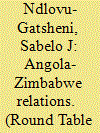

|
|
|
|
|
| Publication |
2010.
|
| Summary/Abstract |
The common approach to the study of foreign policies of Southern African Development Community (SADC) states is to locate them within the context of 'brother presidents' and 'sister liberation movements'. There is emphasis on liberation war camaraderie as a key variable. However, Angola-Zimbabwe (read as MPLA-ZANU-PF and MPLA-MDC) relations have no noticeable strong liberation war-time ties. The relations are traceable to the post-1980 period when the Zimbabwe African National Union-Patriotic Front (ZANU-PF) pursued a deliberate policy of integrating itself within the SADC region and this coincided with the Popular Movement for the Liberation of Angola's (MPLA) long-time desire to isolate its internal enemies of the National Front for the Liberation of Angola and the National Union for the Total Independence of Angola. What is also noticeable is the opacity and ambiguities in Angola-Zimbabwe relations, which have provoked growth of speculation and suspicion. The only time Angola and Zimbabwe openly collaborated was in their intervention in the Democratic Republic of Congo war in 1998 under the auspices of the SADC in general and the SADC Organ on Politics, Defence and Security in particular. However, two recent developments-the state visit to Luanda by the Prime Minister of Zimbabwe and the leader of the Movement for Democratic Change (MDC-T) Morgan Tsvangirai in October 2009, and the announcement by ZANU-PF of the China-Sonangol $8bn investment deal in November 2009-have provoked fresh interest in understanding Angola-Zimbabwe relations in the context of a regional initiative to resolve the Zimbabwe crisis. Although Angola is visible as a member of the SADC in the search for a solution to the Zimbabwe crisis, it has not openly expressed its foreign policy towards Zimbabwe. Unlike Botswana under Ian Khama and Zambia under the late Levy Mwanawasa, which openly criticised President Robert Mugabe and ZANU-PF over governance and its human rights record, Angola has remained quiet, making it hard to know its exact position vis-agrave-vis initiatives towards resolution of the Zimbabwe crisis. Interest in Angolan foreign policy is further motivated by the fact of its ascendancy as one of the regional powers; building on its rich mineral resources, it has the potential leverage to help in the resolution of the Zimbabwe crisis if it openly expressed its position. At the moment, it is not clear whether Angola has also adopted 'quiet diplomacy', just like South Africa under President Thabo Mbeki in its dealings with Zimbabwe.
|
|
|
|
|
|
|
|
|
|
|
|
|
|
|
|
| 4 |
ID:
124493
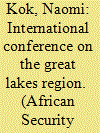

|
|
|
|
|
| Publication |
2013.
|
| Summary/Abstract |
In April 2012 a number of former rebels who had been integrated into the Forces Armées de la République Démocratique du Congo (FARDC) mutinied and formed the Movement of March 23, better know as the M23 rebel group. The International Conference on the Great Lakes Region (ICGLR) has been mediating between Kinshasa and the M23 rebel group since 2012, without much success. In August 2013, the Southern African Development Community (SADC) issued a communiqué after its 33rd Summit of Heads of State and Government, stating that while it commends the ICGLR efforts, the talks have become protracted and a deadline needs to be set. The summit also called for an urgent joint ICGLR-SADC summit to address the crisis in the eastern Democratic Republic of Congo (DRC). In addition to this development, the chair of the ICGLR is to be rotated in December 2013, when President José Eduardo Dos Santos of Angola replaces President Yoweri Museveni of Uganda. To date, the mediation has been headed by Uganda and this has raised concerns over the credibility of the ICGLR-led process, since Uganda has been accused of supporting the M23 rebellion in a report released in November 2012 by the United Nations Group of Experts on the DRC. One could question whether the Angolan leadership will bring anything new that could have an impact on the crisis. Many expect that the perceived neutrality that Dos Santos could bring to the negotiations may be a positive step towards reviving the talks that have all but stalled at this point. Another issue of interest is whether the joint ICGLR-SADC summit could instil new life into the mediation process.
|
|
|
|
|
|
|
|
|
|
|
|
|
|
|
|
| 5 |
ID:
140783
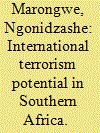

|
|
|
|
|
| Summary/Abstract |
This article discusses the potential factors for the development of international terrorism in southern Africa. While the region has seemingly been spared the terror attacks that have ravaged most other parts of the continent, and the globe at large, it is not immune to these attacks. Using a survey of the Southern African Development Community (SADC) countries, particularly the Democratic Republic of the Congo, Mozambique, South Africa, Mauritius, Zimbabwe, and Tanzania, which illuminate some of the permissive factors, the article asks, largely, first, to what extent is southern Africa at risk of global terrorism? And, second, in what ways can southern African states reduce the risk of terrorism in the region? Broadly, the article contends that, like most developing countries, including those from other parts of Africa, there exist permissive, both root and trigger, factors including insecure borders, democratization challenges, poverty, urban centers and variegated forms of both sub-state and state terrorism, that could provide useful platforms for the growth of international terrorism.
|
|
|
|
|
|
|
|
|
|
|
|
|
|
|
|
| 6 |
ID:
089139
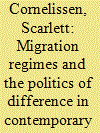

|
|
|
|
|
| Publication |
2009.
|
| Summary/Abstract |
The issue of migration and in particular the increase in irregular or undocumented migration has become highly politicised in Southern Africa. This has involved a rise in social intolerance towards migrant populations and outright xenophobia in many countries. This brief article examines the dynamics and complexities of migration in current-day Southern Africa and contextualises it in relation to the most salient issues, discourses and practices that characterise migration governance at the international level. The article highlights that predominant approaches to the governance of migration in the region reflect some of the dynamics which have marked migration discourse and praxis in the international sphere, but that they also carry some distinct characteristics. Trends of securitisation and related exclusionary practices of citizenship, which have become more pronounced in the international sphere, are emulated in Southern Africa. State and societal processes and reactions to higher levels of regional migration have created a context in which social polarisation and the entrenchment of difference prevails. This has meant that prime questions about how to ameliorate the socio-economic and political circumstances which evoke migrant flows in the first instance, and on how to deal with the inefficiencies in Southern Africa's current migration policies, have remained largely unasked by the region's rulers. Overall, Southern Africa's migration regime evidences two contradictory thrusts, one which seeks to encourage closer regional and specifically economic integration, and the other which resists the assumed threats posed to national sovereignty by increased migrant flows and which leads to a fractious regional governance system.
|
|
|
|
|
|
|
|
|
|
|
|
|
|
|
|
| 7 |
ID:
111837
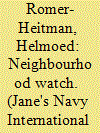

|
|
|
| 8 |
ID:
054589
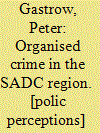

|
|
|
|
|
| Publication |
Pretoria, Institute for Security Studies, 2001.
|
| Description |
89p.
|
| Series |
ISS monograph series; no.60
|
| Standard Number |
0620280719
|
|
|
|
|
|
|
|
|
|
|
|
Copies: C:1/I:0,R:0,Q:0
Circulation
| Accession# | Call# | Current Location | Status | Policy | Location |
| 045036 | 364.1060968/GAS 045036 | Main | On Shelf | General | |
|
|
|
|
| 9 |
ID:
075117
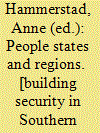

|
|
|
|
|
| Publication |
South Africa, South African Institute of International Affairs, 2005.
|
| Description |
v, 307p.pbk
|
| Standard Number |
1919969349
|
|
|
|
|
|
|
|
|
|
|
|
Copies: C:1/I:0,R:0,Q:0
Circulation
| Accession# | Call# | Current Location | Status | Policy | Location |
| 051953 | 968/HAM 051953 | Main | On Shelf | General | |
|
|
|
|
| 10 |
ID:
072217
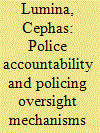

|
|
|
| 11 |
ID:
079783
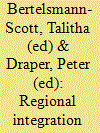

|
|
|
|
|
| Publication |
Johannesburg, South African Institute of International Affairs, 2006.
|
| Description |
vii, 163p.
|
| Standard Number |
1919969594
|
|
|
|
|
|
|
|
|
|
|
|
Copies: C:1/I:0,R:0,Q:0
Circulation
| Accession# | Call# | Current Location | Status | Policy | Location |
| 052782 | 330.2/BER 052782 | Main | On Shelf | General | |
|
|
|
|
| 12 |
ID:
193233
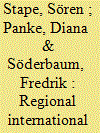

|
|
|
|
|
| Summary/Abstract |
Foreign aid to regional international organizations (RIOs) has increased tremendously in recent decades. The vast differences between RIOs give rise to the question of why some RIOs attract considerable amounts of aid while others attract much less, or even nothing at all. To address that question, this article sets out and examines a set of hypotheses that focus on various characteristics of RIOs that allow donors to reduce transaction costs. Empirically, the analysis proceeds via two steps: the hypotheses are first subjected to an empirical plausibility probe based on quantitative methods and then illustrated based on case study of the Southern African Development Community. The findings reveal that RIOs are most attractive when they operate in a range of policy fields, involve many member-states and are engaged in long-lasting collaborations with donors. By contrast, there is little support for conventional explanations as to why RIOs attract funding – for instance, claims that being democratic, being most in need or providing donors with market access will lead to greater funding. The rather disturbing policy implication is that a small number of RIOs are likely to continue to attract the bulk of funding, whereas poorly funded RIOs are unlikely to attract significant amounts of aid.
|
|
|
|
|
|
|
|
|
|
|
|
|
|
|
|
| 13 |
ID:
052916
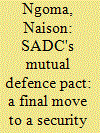

|
|
|
|
|
|
|
|